IT Jobs: How to Get Your First Job in Tech With Zero Experience

It appears there is no world without technology, that intangible thing that forever changed our lives. Therefore, it’s no wonder you will want to get your first IT job!
Yes, it can be hard to break into the industry without experience. In this blog post, we will provide tips for getting into IT with zero experience. We’ll also discuss how to stand out from the competition and land that dream job!
Keep reading!
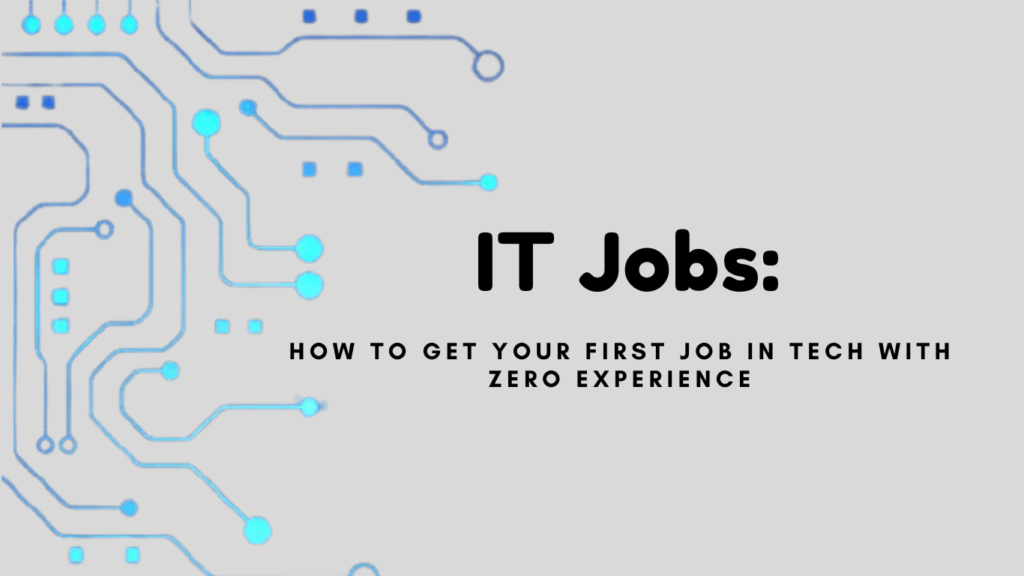
The New Life in Tech
We don’t think there are many people out there who can remember life before technology, especially after the introduction of the first personal computers, famously called “the PC”, in the 1970s. Since then, technology has taken over the world and now, it is an integral part of our lives at work and home. So, it’s not surprising that there has been a recent rise in the use of technology, with the silver lining that there are more opportunities for those who want to get their first IT job!
The demand for IT jobs is constantly increasing with the number of job positions expected to grow by 12% from 2018 to 2028! One of the most important features of the technology sector is employment scope.
Technology employment has historically been higher than total employment, with lower unemployment rates and more promising job prospects
According to CompTIA, shortly as you can see in the graph below, employment in tech-related occupations is predicted to increase at a rate that is roughly double that of overall employment in the United States, with several occupations rising at rates of 4x–5x the national average. This is much faster than the average for all other occupations.
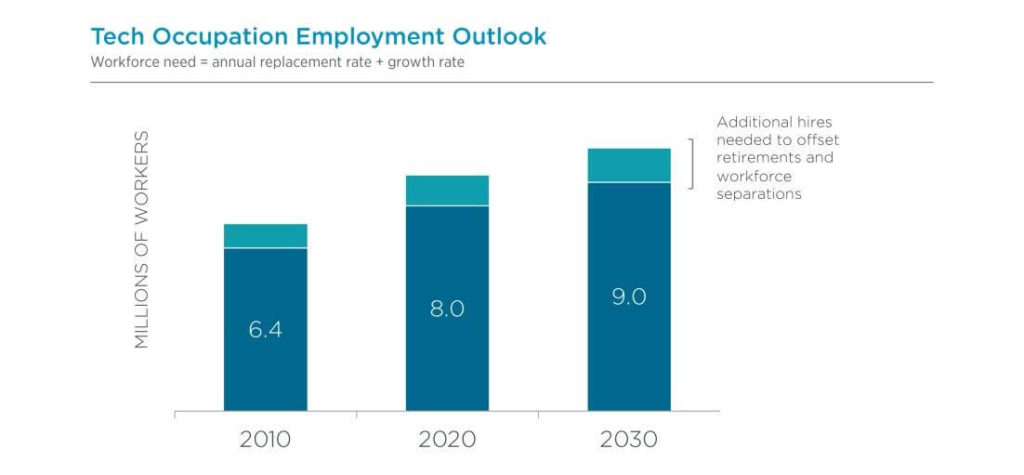
Of course, this scenario sounds promising! Especially, if this means job stability in the long-term. However, if you are one of our readers who still don’t grasp the concept of an IT job, let us clarify it so you can know exactly what you are getting yourself into!
What Is An IT Job?
The concept behind it is actually a lot simpler than you think! “IT” stands for “Information Technology”; therefore, an IT job is simply a job that involves working with computers and technology. This can include anything from computer software, hardware, data storage/retrieval to computer support such as setting up new computer systems to maintaining and repairing existing ones.
IT jobs are found in all sorts of industries, from healthcare to manufacturing and retail
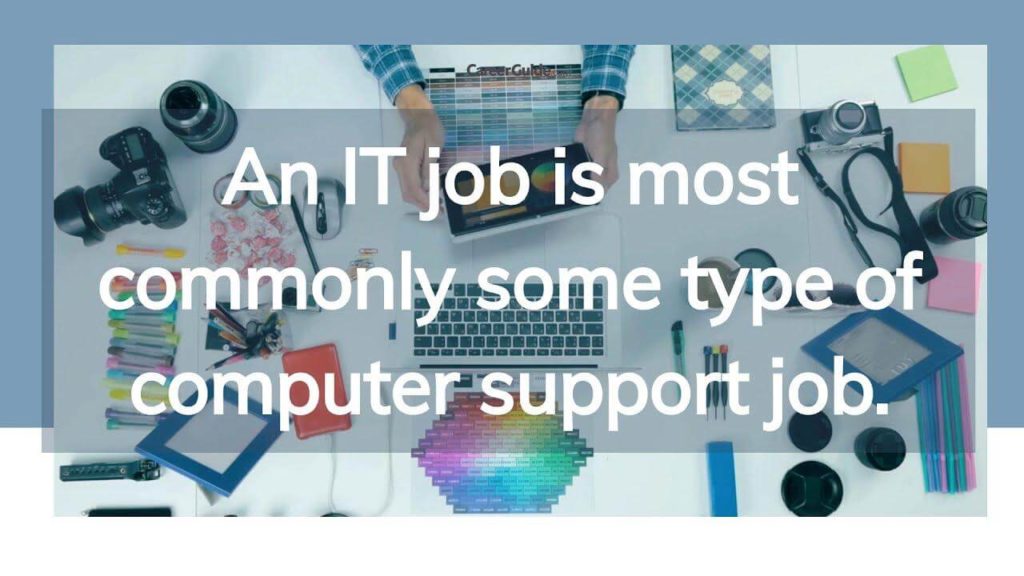
Types of IT Jobs
As we mentioned before, there is a constant demand for IT professionals, and the job market is always changing and growing. This means that many different types of IT jobs are available, ranging from entry-level positions to more specialized ones.
Some examples of entry-level IT jobs include:
- Help Desk Technician
- Computer Support Specialist
- Technical Support Specialist
These roles are typically responsible for providing first-line support to users experiencing technical problems. Help desk technicians may be required to troubleshoot issues remotely or in person, while computer support specialists and technical support specialists typically provide support over the phone or via email
More specialized roles may require a higher level of experience or qualifications, but they can still be a great way to get started in the tech industry. Some examples of these roles include:
- Network Administrator
- Systems Engineer
- Database Administrator
These positions are usually responsible for managing and maintaining computer networks or databases. Network administrators may be required to install new software or hardware, while systems engineers typically design and oversee the implementation of new computer systems.
Database administrators are responsible for ensuring that data is stored securely and efficiently, and they may also be required to troubleshoot database issues.
Below, you can find a solid list of the most in-demand tech jobs (and their average salaries to allure you to do it!)
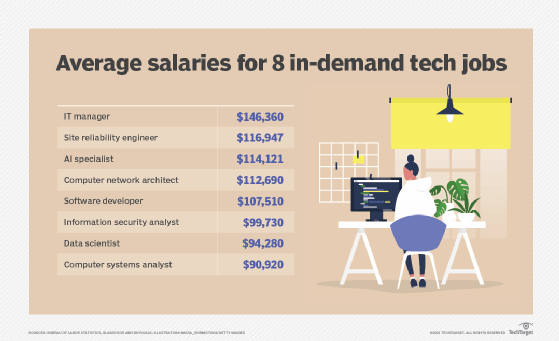
Get more out of your business
Get the best employee engagement content every week via mailing list
Qualifications & Skills Needed For IT Jobs
Whilst some IT jobs may require specific qualifications, such as a degree in computer science, many entry-level positions only need basic computer skills and knowledge.
Some of the skills that may be required for IT jobs include:
- The ability to use computers and technology
- Basic troubleshooting skills
- Good communication skills
- The ability to work independently or as part of a team
While you may not need formal qualifications to get started in the IT industry, a training course can help you develop the necessary skills and knowledge. Many types of IT courses are available, ranging from short online courses to full-time university degrees.
Now that you know a bit more about IT jobs, let’s get to the juicy stuff: How to ACTUALLY get one! Let’s get started.
Tips For Getting Into IT With Zero Experience
There is always room for improvement in this new, wild, shiny world! Here are a few things you can do to improve your chances of getting hired:
Research The Industry
First of all, do some research on what area of IT you might want to focus on. Once you have a good understanding of what’s out there and what interests you, look at job descriptions for entry-level positions in your chosen field.
By reading articles (such as this one), watching YouTube videos, or listening to podcasts, you can learn a lot about the new trends in tech! There are many different sources of information available online, so you should have no trouble finding content that interests you.
Let’s keep going!
Yes, in the past, field experience was always seen as the most important factor when applying for jobs. However, times have changed, and employers are now looking for other candidate qualities. They want adaptable people who are willing to learn new things!
But…
Earn a Degree
Having a degree is always better than having none! Therefore, one of the best ways to qualify for an entry-level IT job is to earn a degree in computer science or a related field.
This will give you the opportunity to learn about different types of computers, software, and networks while also developing important problem-solving skills.
While a degree isn’t always necessary, it can make finding a job in the IT industry easier. In fact, many employers now prefer candidates with a bachelor’s degree in computer science or a related field.
Get Industry Certifications
If you don’t have a degree, another option is to get a certification. Many types of IT certifications are available, ranging from entry-level to more specialized certifications. Entry-level certifications typically cover basic computer skills and knowledge, while more specialized certifications focus on specific technologies or systems.
- Some of the most popular entry-level IT certifications include:
- CompTIA A+ Certification
- CompTIA Network+ Certification
- CompTIA Security+ Certification

These certifications are widely recognized by employers and can help you land a job in the IT industry. IMPORTANT: Degrees and certifications are not the same! The time required to obtain them, the price, and the level of knowledge acquired during the study are the key distinctions between certifications and college degrees. Choose wisely!
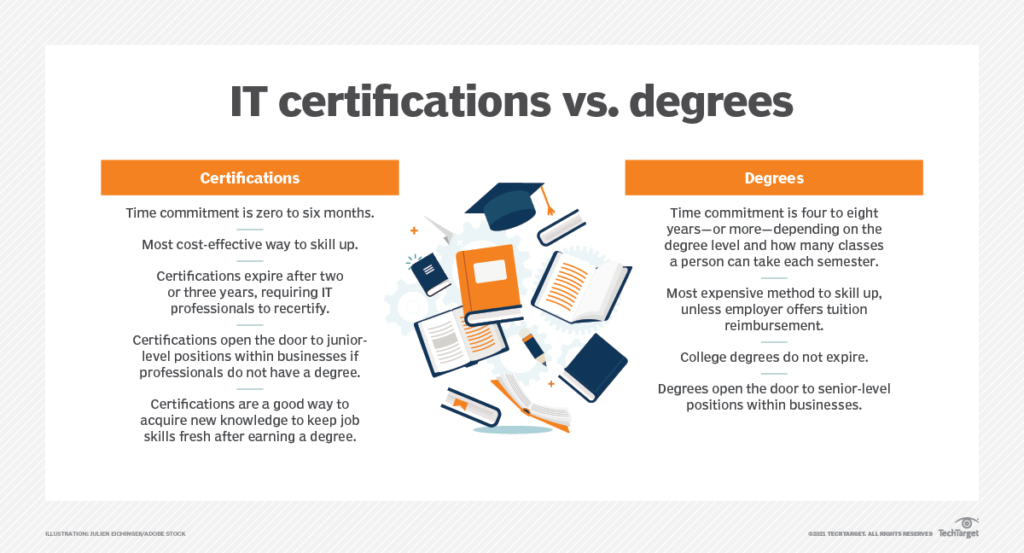
Internships
Another great way to gain experience in the IT industry without having to commit to a full-time job is internships. Many of these are paid, so you’ll be able to earn money while you learn about different aspects of the industry.
Internships can also lead to full-time employment opportunities after you graduate. If you impress your employer during your internship, they may be more likely to offer you a job once you finish your studies.
Not to be cliché (but, we will), this page: Silicon Valley Internship Programme will help you get matched with IT internships in the Bay Area.
Network With People in The Industry
One of the best ways to get your foot in the door is by networking with people who already work in the IT industry. This can be done by attending events, joining professional organizations, or connecting with people online.
LinkedIn is a great platform for networking with professionals in any industry, including IT. You can use it, and you’ll be able to learn about different opportunities, make valuable connections, and potentially land a job in the IT field.
Highlight Transferable Skills On Resume
Take into account that the first job you ever had to the most recent one has helped shape you into the person you are today. And while not every job may have been in the IT field, that doesn’t mean you don’t have any transferable skills relevant to the industry.
Some examples of transferable skills that are relevant to IT include:
- critical thinking
- problem-solving
- attention to detail
- time management
- customer service
- written and verbal communication
These are just a few examples of skills that can be transferred from other industries into IT. From there, start tailoring your resume (and don’t forget to include any relevant coursework!) and cover letter to reflect the specific qualifications that each job is looking for.
Consult With a Career Center or Job Coach
If you’re still unsure how to get your first job in IT, or if you need help with your job search, consider consulting with a career center or job coach.
They can provide you with individualized support and guidance and answer any specific questions you may have. They can also help you assess your skills and experience, develop a resume and cover letter, and prepare for interviews.
Remember that the journey of finding your first IT job doesn’t have to be a solo one. There are many resources available to help you along the way!
Side Gigs and Freelance Work
In today’s digital world, there are many opportunities to make extra money through side gigs and freelance work. These can be a great way to gain experience in the IT field without having to commit to a full-time job.
Many websites offer freelance work, such as Upwork, Fiverr, and PeoplePerHour. You can use these platforms to find short-term projects or one-time gigs to help you build your skills and experience.
Coding Camps (Yes, CAMPS!)
One of the newest trends in the IT industry is coding camps. These are short, intensive courses that teach you how to code. They’re a great way to learn about different programming languages and start coding without having to commit to a full-time job or four-year degree.

Coding camps can range from a few weeks to several months, and they’re offered both online and in-person. Some popular coding camps include Flatiron School, General Assembly, and Fullstack Academy.
Build a Project
Take the initiative to build a project, even if it’s just a small one. This will allow you to not only learn about different aspects of IT but also showcase your skills to potential employers.
You can build a project on your own or with a group of friends. If you’re unsure where to start, many online resources can help you, such as Codecademy, FreeCodeCamp, and Scratch (which can even let you learn drone programming!)
Be Persistent and Consistent
Find those gaps you can fill, try, and don’t ever stop doing it! Once you’ve identified a few potential opportunities, reach out to the company directly and express your interest in working there. You can also stay up-to-date on job openings by following companies on social media or signing up for their email newsletter.
Final Thoughts
By looking at everything Elon Musk or Jeff Bezos, you might think you can’t break into tech, which is an outright lie!
Even if you have no experience, there are still many ways to make yourself attractive to potential employers. So don’t be discouraged – keep learning, networking, and building your skills, and you’ll be on your way to landing that first IT job in no time!
So what are you waiting for? Take the leap and get into technology!


